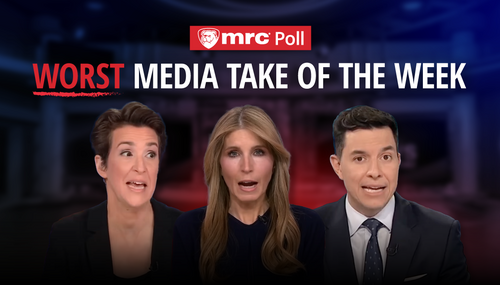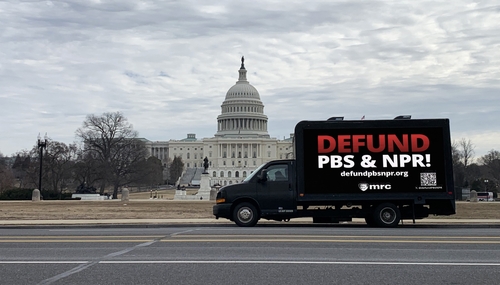During Thursday’s 3 p.m. ET hour, MSNBC anchor Craig Melvin just naturally assumed that President Trump deserved blame for Montana congressional candidate Creg Gianforte assaulting a reporter: “And how much blame should President Trump get, considering some of the rhetoric that we’ve heard from this president and – well, before he was president – and from the candidate himself?”
That question was first directed at former Illinois Republican Congressman Joe Walsh, whose response focused solely on denouncing Gianforte’s actions. Melvin then repeated his Trump-bashing question to Democratic strategist Jamal Simmons: “How much blame should the President get? How much responsibility should he bear given a fair amount of the rhetoric that’s been aimed at the media?”
Predictably, Simmons gave the reply that Melvin was waiting to hear:
Well, President Trump has certainly set this up for about a year or so with the media being the enemy. He even referred to himself, talking about the enemy of the people. We have so many stories of reporters who were standing at Trump events getting glares, getting jeers, all of that. It bleeds over. And when the man who became President of the United States shows such disregard for journalists, I think it’s not unreasonable to think that when a member of Congress, or a candidate for Congress, behaves this way, he’s been influenced by that kind of cavalier attitude toward what’s really a constitutionally protected form of engagement in our society.
Walsh jumped in and promptly called out the absurdity of trying to pin the violent incident on the President: “No, Craig, that’s not right. That’s a bunch of bull. I mean, Trump has called – come on, Craig. Trump has called out the media, he’s never body slammed the media.”
Melvin insisted: “But you would have to concede that the rhetoric, that a lot of what the President has said about members of the media, about journalists, about newspapers, about TV networks, including this one, that hasn’t done anything to help the situation.” Walsh shot back: “Donald Trump has been out there going after the media for a year and a half. How come we haven’t had a rash of attacks out on the street?...We’ve had one congressional candidate get physical last night. You can’t put that on Trump.”
Simmons refused to give up on the left-wing line of attack: “...we cannot separate this, though, from the general tone that’s taking place, particularly from inside the White House, where they are identifying the media as enemies of the people....I think when you call the media enemies of the people, you bear some responsibility when people treat them like enemies of the people.”
MSNBC pushed the same talking point all day. On Morning Joe, co-host Joe Scarborough declared Donald Trump a “Stalinist” and asserted that he was responsible for the violent altercation. On her 12 p.m. ET hour show, anchor Andrea Mitchell claimed the incident was an “extension” of Trump’s 2016 campaign.
Here is a full transcript of the May 25 discussion:
2:35 PM ET
SEN. STEVE DAINES [R-MT]: I think Greg should apologize, I think that is warranted. And let the people of Montana decide what happens tonight.
CRAIG MELVIN: That was Montana Senator Steve Daines there speaking with our own Peter Alexander just a short time ago. That of course coming on the heels of Republican congressional candidate Greg Gianforte allegedly body slamming a reporter. His campaign blaming the confrontation on an aggressive reporter, also blaming it on the liberal media as well. It’s a familiar line of attack because it’s been often been used by then-candidate and now President Donald Trump.
DONALD TRUMP: Katy, let me just say, the press is very, very dishonest. And I think people are wise to the press.
TRUMP: My opinion to the media, it’s very low. I think the media is, frankly, made up of people that, in many cases, not in all cases, are not good people.
TRUMP [FEBRUARY 18]: The dishonest media, which has published one false story after another, with no sources, even though they pretend they have them, they make them up in many cases.
TRUMP [FEBRUARY 24]: A few days ago I called the fake news the enemy of the people, and they are. They are the enemy of the people.
MELVIN: Former Illinois Congressman, Republican Joe Walsh, Democratic strategist Jamal Simmons. Both of them joining me now. Joe, just first of all, your general reaction to what we saw transpire? And how much blame should President Trump get, considering some of the rhetoric that we’ve heard from this president and – well, before he was president, and from the candidate himself?
JOE WALSH: Hey, Craig, my reaction was horrible, outrageous. And I don’t know why there’s not more condemnation on my side, on my Republican side. Look, as a congressman and a candidate, I tussled over the years with members of the media as well, but I don’t give a damn how liberal a reporter is, how obnoxious a reporter is, how biased a reporter is, you never, ever, ever physically assault a reporter. And that’s what happened last night. A candidate for Congress committed a crime. It’s outrageous. And it should be widely condemned.
MELVIN: Jamal, I’ll come to you with that second question I asked Joe there. How much blame should the President get? How much responsibility should he bear given a fair amount of the rhetoric that’s been aimed at the media?
JAMAL SIMMONS: Well, President Trump has certainly set this up for about a year or so with the media being the enemy. He even referred to himself, talking about the enemy of the people. We have so many stories of reporters who were standing at Trump events getting glares, getting jeers, all of that. It bleeds over. And when the man who became President of the United States shows such disregard for journalists, I think it’s not unreasonable to think that when a member of Congress, or a candidate for Congress, behaves this way, he’s been influenced by that kind of cavalier attitude toward what’s really a constitutionally protected form of engagement in our society.
MELVIN: Yeah, but here’s the thing –
WALSH: No, Craig, that’s not right. That’s a bunch of bull. I mean, Trump has called – come on, Craig. Trump has called out the media, he’s never body slammed the media. And think about this, for a year and a half, Trump’s been going after the media, how many nut jobs out in the streets have taken shots at members of the media? Zero. You have a congressional candidate, a congressional candidate, Craig. This isn’t some nut job on the street. He’s got his own issues, man.
MELVIN: But, Joe – Joe, again, I mean, I think one could question this particular candidate’s temperament, yeah. But you would have to concede that the rhetoric, that a lot of what the President has said about members of the media, about journalists, about newspapers, about TV networks, including this one, that hasn’t done anything to help the situation.
WALSH: No, but that rhetoric, this – I tell what you, Craig, the feeling that Trump voters have toward the media, they’ve had for a long, long time. And again, I think it’s amazing, Donald Trump has been out there going after the media for a year and a half. How come we haven’t had a rash of attacks out on the street? It’s amazing. We’ve had one congressional candidate get physical last night. You can’t put that on Trump.
SIMMONS: Look, this particular candidate bears responsibility for his own behavior. I’ve been in situations where candidates have almost gotten physical and have regained their composure and decided not to do it. But this particular candidate has his own thing. I think we have to – we cannot separate this, though, from the general tone that’s taking place, particularly from inside the White House, where they are identifying the media as enemies of the people, phrases that they don’t even use anymore in Russia – which is apparently a place where the President gets a lot of conversation in his political life – we don’t even hear phrases like that coming from places like that. So I think when you call the media enemies of the people, you bear some responsibility when people treat them like enemies of the people.
(...)




